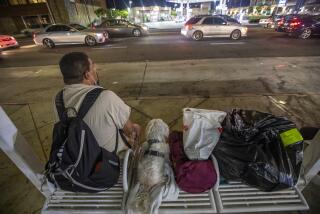Encinitas Hires Firm to Clear Migrant Camps
ENCINITAS, Calif. — With little fanfare Wednesday, a security firm hired by this north San Diego County seaside community began patrolling a secluded piece of city-owned swampland to extinguish a growing Guatemalan migrant community that has taken root there.
In an early morning fog, security firm owner Joseph Canales eased his four-wheel-drive truck along a dirt road behind a market near Interstate 5, scouting out migrants. His company, Carlsbad Security Patrol, is being paid $31,000 by the Encinitas city government to put the word out to scores of Guatemalans who have set up camp in the area’s dense undergrowth that their presence will no longer be tolerated on the property.
Rather than incite conflicts, Canales and his employees have been instructed to contact local law authorities if problems arise in clearing the living sites.
The Guatemalan camp issue has become a major test for this coastal city in its efforts to control the influx of migrant laborers from throughout Latin America. The Guatemalan camps, with hastily constructed cardboard and wood shelters, stand in stark contrast to--and often within several hundred feet of--upscale housing tracts and condominium complexes.
City officials have expressed particular concern that a two-year buildup of trash and human waste at the impromptu camps poses a public health hazard. And the constant presence of migrants in the area has angered some local businessmen, who claim to have lost potential sales from customers scared away from their stores.
One of the businesses blaming the migrants for a loss of revenue is the Encinitas outlet of Big Bear Market. Larry Mabee, president of the chain’s San Diego division, said of the migrant issue, “It’s society’s problem, but no one wants to do anything about it. Well, we’ve suffered hard-cash dollar losses. Until we find the final solution, what more can we do but move them down the road?”
Advocates for migrants have decried the city’s decision to force the Guatemalans from their camps, countering that officials should instead be establishing legal living sites with portable toilets. “The attitude of many people here is that these migrants should be out of town by sundown,” said Claudia Smith, a lawyer for California Rural Legal Assistance, a migrant rights group. “It’s OK for them to work all day in our growing field, but we don’t want to see them after that.”
Despite $25,000 in city funds recently spent to wage a cleanup campaign of the area--in which migrants’ belongings often were thrown away after camp residents left the area for the day--the workers have persisted in rebuilding their makeshift huts among the 18 acres of eucalyptus, bamboo and thick brush, officials say.
And so last month, in a controversial 3-2 decision, city officials voted to hire Canales’ security firm.
On Wednesday, local reaction to the new security presence was mixed.
Dennis Fritz, an assistant manager at a gas station and mini-mart, said recent city efforts to discourage workers have reduced the number of Guatemalans who gather outside the business each morning.
“These people don’t bother me; what bothers me is the government’s harsh treatment of them,” he said. “Instead of shooting rockets to the moon, we ought to be taking care of problems like this right here on the ground. I’ve seen whole families--men, women and children--crawl out of that camp, even in the pouring rain.
“We should be providing some place for them to live, with proper toilet facilities, not running them out like animals.”
Dan Elias, who owns a house overlooking the city’s property, said he once walked to his job as a barber in a nearby shopping center complex. But no more, not after the Guatemalans took over, he said.
“I’ve seen it go from a pristine area that was a natural place for kids to play to become nothing but a dump,” he said. “I built a back porch to overlook the area, but now all I see are people urinating. That’s the reality we have to deal with.”
More to Read
Sign up for Essential California
The most important California stories and recommendations in your inbox every morning.
You may occasionally receive promotional content from the Los Angeles Times.










